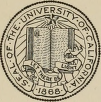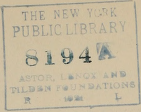
George Washington Cable.
“Posson Jone.”
The constitutional history of the Louisiana Purchase, 1803-1812
The constitutional history of the Louisiana Purchase, 1803-1812
Brown, Everett Somerville, 1886-1964
One of the most striking features of the history of the United States is the gradual extension of its boundaries westward and the successful operation of a colonial; or territorial, system of government. Hardly had the Constitution, which contained no specific grant of power to acquire territory, been put into effect when the first step in the acquisition of foreign territory was made. The purpose of this monograph is to discuss the most important of the constitutional questions which arose as a consequence of the purchase of Louisiana, and to show how the statesmen and legislators in charge of affairs at that time interpreted the Constitution in answering those questions. Much has been written on the Louisiana Purchase but no connected narrative of its constitutional aspects has hitherto appeared.
The writer believes that he has added many important details to the printed accounts of United States history. For instance, he has given, for the first time, the detailed story of the Senate debate on the Breckinridge Bill. Then, too, there is much to be learned of the struggle between correct theory and actual practice in government from tracing Jefferson's plans for the settlement and government of Louisiana. The status of the inhabitants of territories — so fruitful a theme for controversy even to the present day; the control of slavery and the slavetrade by Congress, set forth with startling bitterness in tlie Senate debate on the Breckinridge Bill; and the Indian and land questions, always incidental to American westward expansion, all have new light shed upon them.
A certain limitation should here be made. This study has been confined principally to the lower part of the province purchased from France, that which was organized as Orleans Territory and which later entered the Union as the state of Louisiana. Occasional reference is made to Upper Louisiana but to have traced the constitutional history of the entire area known as Louisiana would have involved entering a field almost limitless in extent. The writer hopes, however, to make further investigation of the constitutional history of the territorial expansion of the United States.
In writing this monograph, much hitherto unpublished manuscript material has been utilized. Personal investigation was conducted in the following places: the University of California Library; the Bancroft Library; the Cabildo (home of the Louisiana Historical Society), and the City Hall, New Orleans; the Library of Congress, especially the Manuscript Division; the Bureau of Rolls and Library of the State Department, Washington, D. C.; the Boston Public Library; the Massachusetts Historical Society Library; the Athenaeum; Harvard University Library; the American Antiquarian Society Library, Worcester, Mass.; the New Hampshire Historical Society Library, and the New Hampshire State Library, both located at Concord; and the New York Public Library.
Much new information was obtained from the William Plumer manuscripts, a mine of hitherto little-consulted material. William Plumer was born at Newburyport, Massachusetts, in 1759, but moved with his parents to Epping, New Hampshire, in 1768. He was given a liberal education, following which he engaged in the practice of law. Entering the political field, he served for a number of years in the state legislature, and rose to the position of presiding officer of the house of representatives and, later, of the senate. He was a member of the state constitutional convention in 1791-1792; served as United States senator from New Hampshire from December 6, 1802, to March 3, 1807; was governor of his state for the terms of 1812-1813 and 1816-1819; and, as presidential elector in 1820, cast the single vote against James Monroe. Plumer devoted the later years of his life to literature. He died in 1850.
Having decided early in life to write a history of the United States, Plnmer made use of every opportunity to collect materials to that end. His ambition as a historical writer was not gratified, but he left a vast quantity of manuscripts, invaluable for the history of his period. A small part of this collection was used by William Plumer Jr. in his Life of William Plumer. In that book, however, the younger Plumer practically ignored the very valuable memorandum which Senator Plumer kept of the debates in the United States Senate from 1803 to 1807. This memorandum gives detailed information on government matters seemingly nowhere else obtainable. Neither the Government nor the newspapers at that time kept a full report of the debates in Congress. Especially was this true of those of the Senate.
A part of this "Memorandum" was contributed by the present writer to the American Historical Review, XXII (1917), 340-364. No other writer, so far as I can ascertain, has extensively used the Plumer "Memorandum." In the monograph a differentiation in citation is made between the "Memorandum" and Plumer's letters, the latter being referred to as MSS. Plumer's papers have not been arranged in any more definite order than that in which he left them, which makes citation of them rather difficult.
Other important manuscripts used were the Claiborne Papers, consisting of six volumes entitled "Claiborne's Correspondence relative to Orleans Territory,'' and one volume, '' Orleans Territory, Miscellaneous." These volumes in the Bureau of Rolls and Library in the Department of State in Washington, contain Governor Claiborne's reports of the territorial government of Louisiana, or, to be more exact, of Orleans Territory, from
The writer wishes to thank all those librarians and archivists who made possible his search for materials. In particular, in this respect, does he owe much to the never-failing kindness of Mr. John C. Fitzpatrick of the Manuscript Division of the Library of Congress. Acknowledgments are also due to Professor Frederick J. Teggart of the University of California for suggestive criticism; and to Professor Herbert E. Bolton and the editorial committee of the University of California Press for the editing of the monograph. The writer's wife was especially helpful in the arduous task of copying manuscripts and in reading proof. Finally, the writer desires to express his appreciation of the kindly and scholarly assistance of Dr. Eugene Irving McCormac of the University of California, under whose guidance this study was made.
Everett Somerville Brown.
Washington, D.C, December 18, 1918.

